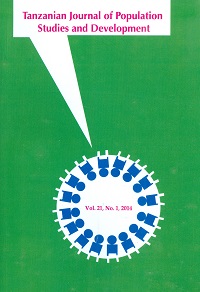Post-Economic Liberalization Coping Strategies After Introduction of One Licence System in Tanzania: A Case of the Matengo Coffee Growers in Mbinga District
Abstract
This paper examines coffee production in post-economic liberalisation in Mbinga District, Tanzania. It documents the coping strategies of the Matengo coffee growers after introduction of one licence in coffee marketing system in Tanzania in 2002. It gives a succinct history of coffee marketing as well as impact of the 2001 Coffee Industry Act. It explores how the coffee farmers sustained coffee production despite increasing costs of production and business malpractices of the Private Coffee Buyers (PCB). This paper is based on study conducted in Mbinga District. The sample size was 86 respondents who were selected randomly, as well as 20 members from two farmers groups. The study found out that production of high quality coffee, and proper timing of coffee marketing, are some of the strategies adopted by the Matengo coffee growers after introduction of one licensing system following the liberalization of coffee marketing system. The paper concludes that despite the odds of coffee cultivation after market liberalization, the Matengo coffee growers are used to the free market system, and have to a greater extent managed to adopt well the coping mechanisms to sustain coffee production.
References
Baffes, J. 2003. Tanzania ' s Coffee Sector: Constraints and Challenges in a Global Environment. World Bank African Region Working Paper Series No 56.
Basehart, H. 1972. Traditional History and Political Change among the Matengo of Tanzania. Journal of the International African Institute, Volume XLII No. 2: 87-97.
Cooksey, B. 2003. Marketing Reform? The Rise and fall of Agricultural Liberalisation in Tanzania. Development Policy Review 21: 67-91.
DALDO. 2005. Annual Report, Mbinga District Council, Mbinga, Tanzania
Ellis, F., & H. Freedman. 2004. Rural Livelihood and Poverty Reduction Strategies in Four African Countries. Journal of Development Studies 40 (4) April, pp 1-30.
ICO. 2004. ICO Price Indicator Price Monthly and Annual Average in 2004-2007. http/www.ico.or/prices/p2.htm (accessed January 2007)
Itani, J. 1998. Evaluation of an Indigenous Farming System in the Matengo Highlands, Tanzania, and its Sustainability. African Study Monograph.
JICA. 1998. Integrated Agro ecological research of the Miombo Woodlands in Tanzania. Sokoine University of Agricultural and Centre for African Area Studies, Kyoto University, Japan.
Kato, M. 2001. Intensive Cultivation and Environmental Use Among the Matengo in Tanzania. African Study Monographs, 22(2): 73-91.
Larson, R. 2001. Between Crisis and Opportunities: Livelihoods, Diversifications and Inequality Among the Meru of Tanzania. Lund Dissertation in Sociology 41.
Maghimbi, S. 1992. Abolishment of Peasants Cooperatives and Crisis in the Rural Economy of Tanzania. In: P.G. Foster & S. Maghimbi (eds), Tanzania Peasantry: Economy in Crisis, Avebury, Gower Publishing Co Ltd, Aldershot, England
Mapunda, K.J. 1998. Problems of Promoting Members Based Cooperative Societies in Tanzania, A Case Study of Mbinga District. MA Thesis, University of Dar es Salaam, Tanzania.
Mhando, D.G. 2005. Farmers Coping Strategies with the Changes of Coffee Marketing System After Economic Liberalisation. PhD Thesis, Kyoto University, Japan.
Mhando, D.G. 2007. Farmers Coping Strategies to a Changed Coffee Market after Economic Liberalisation: The case of Mbinga Distrcit in Tanzania. African Study Monograph, Supplementary Issue, No. 36, pp 39-58
Nindi, S.J. 2004. Dynamics of Land Use Systems and Environmental Management in the Matengo Highlands, Tanzania. PhD Thesis, Kyoto University, Japan.
Ponte, S. 2002a. Brewing a Bitter cap? Deregulations, Quality and the Reorganisation of Coffee Marketing in East Africa. Journal of Agrarian Change, Vol. 2 No. 2: 248-272.
€”. 2002b. Growers and Markets in Tanzania. Mkuki na Nyota Publishers, Dar es Salaam, Tanzania.
Ringo, J. 1995. Cooperative Members Education: Problems and Prospects of Member ' s Education in Primary Societies, A Case of Three Primary Societies in Mbinga District. MA Thesis, University of Dar es Salaam, Tanzania.
TCB. 2002. Coffee Sector Strategy 2001/2006. Dar es Salaam: Business Care Limited.
Temu, A. 1999. Empirical Evidence of changes in the Coffee Market After Liberalisation: A Case of Northern Tanzania. PhD Thesis, Urbana, Illiois, USA.
Temu, A., W. Nelson, & P. Carcia. 2001. Market Liberalisation, Vertically Integration, and Price Behaviour in Tanzanian ' s Coffee Auction. Development Policy Review, 19: 205-222.
United Republic of Tanzania (URT). 2002. Coffee Industrial Act 2001, Bill supplement, 28th December, Dar es Salaam: Government Printer.
€”. 2003. Tanzania Coffee Industry Regulations 2003. Dar es Salaam: Government Printer.


